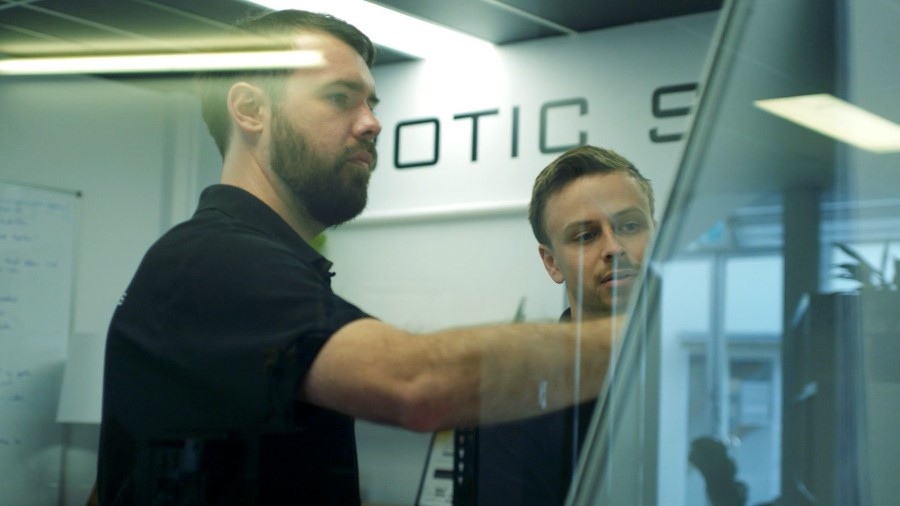
When it comes to concepts, the crazier the better, says Adam Amos.
The engineering young gun and Director and Founder of Newcastle-based Robotic Systems relishes the challenge of turning a client’s idea into reality.
“We specialise in projects that no one else will take on because they think they are not possible,” Mr Amos, pictured, said.
“We take a crazy concept, validate it and turn it into a working, living prototype within three to six months.
“The best projects are those that are going to result in a patent and some sort of new, defensible technology position because that’s how you know you have created something important.”
Robotic Systems specialises in designing industrial products: machines that get bought for work reasons to solve a workplace problem.
The team’s engineers, scientists and artists use electronics, software and hardware to turn customers’ practical experience into game-changing new products.
“We design circuit boards, we do industrial design, we manufacture it, we do software development, and we do assembly line production,” Mr Amos said.
Among their commercially successful achievements are an airborne weed-locating system, a fragmentation-measurement tool used in rock blasting and a threat-detection system using artificial intelligence for trains.
“We work with people who have a strong practical experience with a problem in their industry,” Mr Amos said.
“They understand the problem so well that they can see a way to potentially fix it, if only they had some piece of tech to do that.
“What we do is take the IP in our customers’ heads, unpack it and turn it into a new type of machine that our customers own and sell.
“We do that energy conversion between people’s heads and the real-world thing — it’s an end-to-end solution from the validation of an idea, to developing a prototype and finally manufacturing.”
Clients retain their IP.
“We just build the product and move on to the next project,” Mr Amos said.
“What we do is convert the IP from one form to another. The technology development is only one part of the problem. A successful product requires an equally important industry understanding to turn that into a commercial success.”
Drawing ideas out of clients is a skill that Mr Amos has finely honed.
“We start with the business case,” he said.
“One of the first things I ask people is if they understand the dollar value of the problem they’re trying to solve. So, we take a few simple statements about the ‘whats’ and the ‘how’ of a machine and back that out into a full spec, turning it into a digital proof of concept then into the real-life thing.
“It’s a showing process. We show our customers what they’re looking for, rather than tell them what they’re looking for.
"Our signature development process is optimised to be delivered online, so our design team can work with mining and agriculture companies Australia-wide."
The engineering consultancy is growing rapidly, with four staff members two years ago, 17 today and 20 predicted by the end of the year.
Like all success stories, many lessons have been learnt along the way.
For much of its 10-year history, Robotic Systems made its own products, which proved commercially unsuccessful.
“We were making products for the sake of making products, rather than to solve a problem,” Mr Amos said.
“Now, we only develop other businesses’ hardware tech, because in order to make a successful product, you need to understand not only how to develop the technology but understand the business and the industry that that product is going to operate in and live in.
“For us, as the experts in the ‘how’ in the tech, we can’t possibly hope to understand all those possible scenarios.
“So, we just focus on the ‘how’ — on designing electronics, software and hardware for the sole purpose of accelerating the design and manufacture of other businesses' hardware technology products. Our big uniqueness is that we have all the skillsets under the one roof to be able to do that, all the way from idea through to manufacturing.
“Since we got clear on what we do, who we do it for and why, there has been a big turnaround from the previous eight years of operation.
“We’ve had four patents filed by our customers for tech we have developed on their behalf, and we have shipped more than $3million of products to nine countries in the past 12 months from our Newcastle manufacturing facility.
“We have picked up a whole bunch of the biggest mining companies in the country along the way and have a number of repeat customers.”
To fellow entrepreneurs, Mr Amos says: “Pick a niche. Whatever it is, pick the niche that you truly enjoy and work at just that.
“Don't go too far beyond that. I started like that, although I didn’t know that at the time, but then I went too big and wasn’t really good at anything.
“Sticking to a niche has been, above everything else, the No.1 driver of our success.”
For more information, visit Robotic Systems.
Robotic Systems has been a member of Ai Group since 2017
“The Robotic Systems team and I have received great support, learning and contacts from The Australian Industry Group since we first signed up. The knowledge, lobbying and contacts that Ai Group provides for its members are invaluable tools within our organisation." — Adam Amos, Director, Robotic Systems